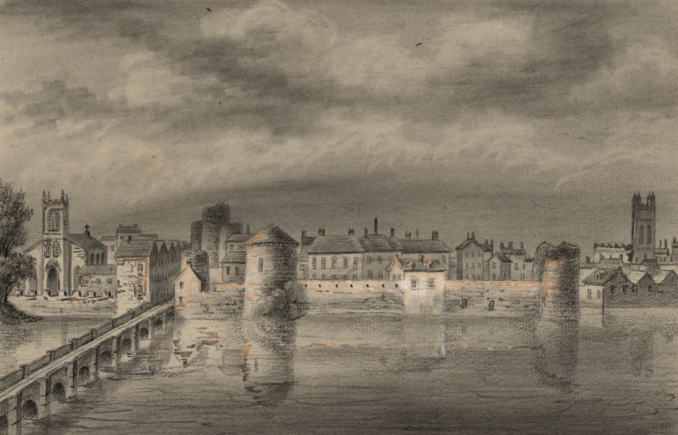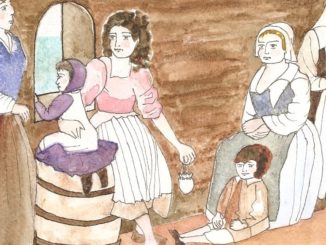
Public Domain
Both English and, to a much greater extent, Scottish and Irish Gaelic are full of words spelt very differently from the way they are pronounced. These are ‘archaeological’ pronunciations reflecting the way the language was spoken many centuries ago. Pronunciation has changed but the spelling hasn’t.
Here are some traditional limericks on the pronunciation of British surnames and place names, plus a final seven which I cobbled together myself. If you are stumped by any of the names, there is a key in alphabetical order at the end of this article.
There was a young fellow named Cholmondeley,
Whose bride was so mellow and colmondeley
That the best man, Colquhoun,
An inane young bolqufoun,
Could only stand still and stare dolmondeley.
The bridegroom’s first cousin, young Belvoir,
Whose dad was a Lancashire welvoir,
Arrived with George Bohun
At just about nohun
When excitement was mounting to felvoir.
The vicar — his surname was Beauchamp —
Of marriage endeavoured to teauchamp,
While the bridesmaid, Miss Marjoribanks,
Played one or two harjoripranks,
But the shoe that she threw failed to reauchamp.
An adventurous pirate named Menzies
Simultaneously boarded two denzies.
The Rover, Sir Ralph,
Said, ‘Do you think that’s salph?
You don’t want to damage your thenzies.’
The Baron of Fawsley, Lord St John,
Had a fine buckskin coat with a frt john.
He said, ‘It was guthven
Me by Viscount Ruthven,
Who thinks I’m a cowboy, or t john.’
As a youngster Sir Reggie Pole-Carew
Was a cissy, and dubbed the schole farew.
He fled from Lord Tyrwhitt,
Who dressed as a spyrwhitt,
For he found any ghost or ghole scarew.
The virginal Miss Carew-Pole
Was preparing a goosebarew fole
Inside the cole darew,
When in came Pole-Carew
And showed her his big harew tole.
A student of Gonville & Caius
Was endowed halfway down to his knaius.
The Chaplain’s young wife
Said, ‘No, not on your life.’
But the Chaplain himself said, ‘Yes, plaius.’
The former PM, Douglas-Home,
Was stricken by terrible glome.
He told Duncan Sandys,
‘It’s caused by my glandys,
I’ll just have to stay in my rome.’
A colonel by name Leveson-Gower
Mixed gin, rum, stout, lime jeveson mower
In a drink for Miss Featherstonehaugh
Who said to him, ‘Meatherstonehaugh,
This stuff might have some yeveson wower.’
The regiment’s pet, Private Wemyss,
Confided his sexual dremyss
To cruel Captain Mainwaring,
Who gave him a spainwaring
Until the air rang with his scremyss.
A Frenchman residing in Mousehole,
Whose consumption of wine was a pousehole,
Caused his wife to say, ‘Yves,
I just don’t belyves
How much of the stuff you can gousehole.’
Lord Montagu raced around Beaulieu,
His conduct was wild and unreaulieu.
They sent him a letter:
‘My Lord, behave better,
Or else we will smash you. Yours treaulieu.’
A lion-tamer living in Beaudesert
Kept a lioness, whom he called Eaudesert.
On the boat to Dun Laoghaire,
Feeling hungry and waoghaire.
She ate him, then took Alka-Seaudesert.
In the river, an angler named Dalziel
Was horribly mauled by an alziel.
All tattered and tachan,
He told his pal Strachan,
‘You have no idea how I falziel.’
A couple whose surname was Bean
Too often to humour would lean.
They chose the name Sean
When their first son was bean —
Now wasn’t that horribly mean?
Guide to pronunciation
Bean > like the vegetable, not like Sean
Beauchamp > Beecham
Beaudesert > Beezer
Beaulieu > Bewly
Belvoir > Beever
Bohun > Boon
Caius > Kees
Carew-Pole > Cairy-Pool
Cholmondeley > Chumly
Colquhoun > Cohoon
Dalziel > Dee-ell
Dun Laoghaire, see Laoghaire
Featherstonehaugh > Fanshaw
Gower, see Leveson-Gower
Home > Hume
Laoghaire > Leery
Leveson-Gower > Loosen-Gore
Mainwaring > Mannering
Marjoribanks > Marshbanks
Menzies > Ming-iz
Mousehole > Muzzel
Pole-Carew > Pool-Cairy
Ralph > Raif
Ruthven > Riven
Sandys > Sands
Sean > Shawn
St John > Sinjun
Strachan > Strawn
Tyrwhitt > Tirrit
Wemyss > Weems
Yves > Eev
Compiled and partly written by Tachybaptus 2022 — no copyright should or can be claimed on limericks



